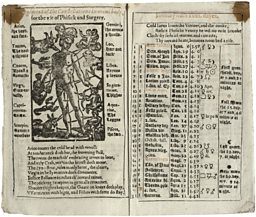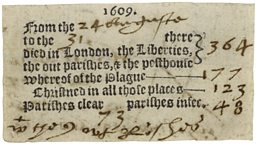The fear of spreading disease is bad news for many travelling performers
Even though London had not suffered an attack of the plague since 1603, the fear of spreading disease was still acute across England some twenty years later.
Many towns and cities, including Worcester, laid down strict controls on travelling performers, and would even pay them to go away, rather than risk them bringing unwanted infection to the city folk.
-
![]()
Much ado near me
Hear more Shakespeare stories on BBC Hereford & Worcester
-
![]()
Shakespeare Festival 2016
The BBC celebrates the genius of the bard

In 1622, Worcester’s civic leaders issued a clampdown on travelling performers. By this time, Shakespeare himself had been dead six years, but his performing troupe, The King’s Men, played on.
Those deemed to carry the highest risk of carrying disease were the minstrels and the ballad-singers. These individuals came to the city without official sponsorship – or patronage – from either the court, gentry or royalty. They were effectively expelled from the city.
Next in line were travelling companies of players, and the council ordered that those performing groups travelling under gentry patronage might be allowed to play at the lower end of the town Guildhall, but only after the payment of a substantial sum. The order, from Worcester’s records state quite firmly:
“…that noe playes bee had or made in the vpper end of the Twonehall (Townhall) of this Cyttie nor Councell Chamber vsed by anie players whatsoever, And that noe players bee had or made in Yeald (Guildhall) by nyght tyme,..”
Thankfully for The King’s Men, travelling under the highest of royal patronages, Worcester’s leaders showed political expediency in allowing some exceptions to these levels of control. In the following year (1623), the City Council quite happily paid thirty shillings for performances by ‘the kings Players,’ - twenty shillings on one occasion, and ten on another. In the following year (1624-5) the Council again reimbursed the Mayor fifteen ‘shillengs’ for the payment he made to ‘Players…the kings Revelers.’
It was less a question of money than of patronage. Fear of infection led to the closing of city gates against travellers, especially those who had come into contact with crowds at markets and fair days. But patronage had its advantages; players with connections to the royal family might still play and still be paid their fees.
But even royal patronage came to an end: a severe outbreak of the plague took place in 1625, and in 1630–31 the Worcester City Council clearly feared the risk of disease more than upsetting royal patronage.
Worcester paid the King’s Players 13 shillings and four pence (13 s. 4 d.) not to play “to prevent theire playenge in this Citie for feare of infeccion.”
David Klausner, Professor Emeritus, University of Toronto and Records of Early English Drama editor for Herefordshire/Worcestershire (1990)
A bill of Mortality from the 1600s

Shakespeare on Tour
From the moment they were written through to the present day, Shakespeare’s plays have continued to enthral and inspire audiences. They’ve been performed in venues big and small – including inns, private houses and emerging provincial theatres.

BBC English Regions is building a digital picture which tracks some of the many iconic moments across the country as we follow the ‘explosion’ in the performance of The Bard’s plays, from his own lifetime to recent times.
Drawing on fascinating new research from Records of Early English Drama (REED), plus the British Library's extensive collection of playbills, as well as expertise from De Montfort University and the Arts and Humanities Research Council, Shakespeare on Tour is a unique timeline of iconic moments of those performances, starting with his own troupe of actors, to highlights from more recent times. Listen out for stories on Shakespeare’s legacy on your BBC Local Radio station from Monday 21 March, 2016.
You never know - you might find evidence of Shakespeare’s footsteps close to home…
Craig Henderson, BBC English Regions
-
![]()
Shakespeare Lives
The nation’s greatest performing arts institutions mark 400 years since the Bard's death
Related Links
Shakespeare on Tour: Around Hereford and Worcestershire
-
![]()
A theatre fit for a Queen
Queen Victoria impressed by Shakespearean actor Stephen Kemble’s home town of Kington
-
![]()
Famous child actor plays at Ledbury
Are these young child actors really talented, or are they victims of exploitation?
-
![]()
A horse! A horse! My kingdom for a horse!
King Richard III's horse White Surrey is the star of the show
Shakespeare on Tour: Around the country
-
![]()
The King's Men generously welcomed to Cumbria
King James I also spends time in Cumbria
-
![]()
Shakespeare… by gaslight!
An 1819 playbill invites people to enjoy the newly-installed gas lighting in the theatre
-
![]()
Shakespeare's acting company come to Barnstaple
Was Shakespeare among them?
-
![]()
Garrick’s festival entertains a Birmingham audience
Famous Jubilee Shakespeare celebration comes to the second city










